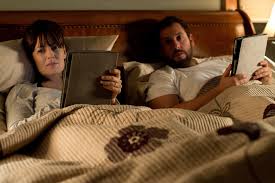3 / 5 stars
Juno director Jason Reitman makes a spirited attempt to capture the essence of modern digital life, as porn-addicted husband Adam Sandler finds he’s not the only one seeking online solace
There’s a funny YouTube compilation from dozens of modern thrillers and horror films, simply showing panicky people all saying: “My cellphone! I can’t get a signal!” Modern movie-making is unhappy about modern digital devices messing up traditional plot devices. Cyber-interconnectedness is spoiling solitude, ruining jeopardy. So this movie from director Jason Reitman and his co-writer Erin Cressida Wilson (which they adapted from the 2011 novel by Chad Kultgen) is an interesting, spirited, if finally rather sentimental attempt to tackle this issue and set it to rest. It wants to show 21st-century lives being lived out on screen and online, with both older and younger generations now dependent on the web. Teens get bombarded with adult material unimaginable to their parents at the same age; grownups are infantilised, tempted into digital arenas of fantasy and irresponsibility.
It’s a watchable soapy drama, though audiences who remember films by Todd Solondz or Antonio Campos on similar themes – or indeed Erin Cressida Wilson’s own great screenplay for Secretary (2000) – may find it a bit softcore. One subplot incidentally comes close to reproducing the punchline of Rupert Holmes’s song about piña colada and getting caught in the rain.
The film has a dreamy framing sequence set in space, accompanied by deadpan narration from Emma Thompson, musing on Planet Earth being in Carl Sagan’s words, a “pale blue dot”. This puts the teen angst into perspective, rather like the observatory scenes in Rebel Without a Cause.
The taciturn male at the centre of this ensemble is Don, a depressed guy in a stagnant marriage played by Adam Sandler; his only solace is online porn, far more important than the old-fashioned staples of TV and beer. In search of his fix, he one day finds that the Wi-Fi is only working for the computer in his 15-year-old son’s bedroom, where a browser history reveals that young Chris (Travis Tope) is consuming harder stuff than his dad. This is impeding his relationship with super-hot cheerleader Hannah (Olivia Crocchicia), whose failed-actress mom Donna (Judy Greer) now manages Hannah’s own lucrative subscription porn/voyeur fansite. Meanwhile, Tim, played by Ansel Engort (from The Fault in Our Stars) has dropped out of the school football team to dedicate himself to (or, in his words, “invest in”) an immersive online fantasy roleplay game, and has now formed a relationship with shy Brandy (Kaitlyn Dever), whose uptight, controlling mom (Jennifer Garner) monitors her every keystroke. The kids’ cyberfreedom is dependent on the adult bill-payer.
What a fantastically unwholesome situation it all is, and yet interestingly this film is both a melodramatic intensification of real-life web addiction, and also a cautious dilution. There’s nothing in this film about people walking hilariously into lamp-posts while looking at their phones – but also nothing about revenge porn, nothing about private humiliation going viral. Yet there are sharp moments of alienation and fear. Reitman and Wilson show that Donna’s creepy fansite becomes acceptable to mother and daughter simply because they are so deeply excited by the increasing numbers of subscribers and the accretion of homemade celebrity, very like the weekly uptick in follower numbers that no Twitter user admits to being interested in.
At first, Reitman makes quite a conspicuous play of showing online graphics on the screen itself: the Facebook pages, the web browsers, the text messages get flashed up over the frowningly entranced faces bent over their laptops and phones. There is some ironic comedy to be had here: particularly in two people secretly and derisively texting about a third person who is right in front of them, a dysfunctional practice camouflaged by the fact that everyone is on their phones all the time. As the movie advances, and ironic detachment recedes, this on-screen gimmick noticeably declines, too, and by the end it has disappeared altogether, although everyone’s web use has not really diminished one bit. Yet while it lasts, this is an interestingly metaphorical display of movies and online content competing for our frazzled attention.
In some ways, Men, Women & Children is a little like those movies of yesteryear about how TV (and particularly TV news) is terribly worrying. But this one inevitably tends towards emotional fence-sitting because of its reluctance to condemn its characters and satirically abandon them to their supposed web enslavement. A movie that really engages with web use still eludes us. In the meantime, this engaging black-comic sketch will do.








